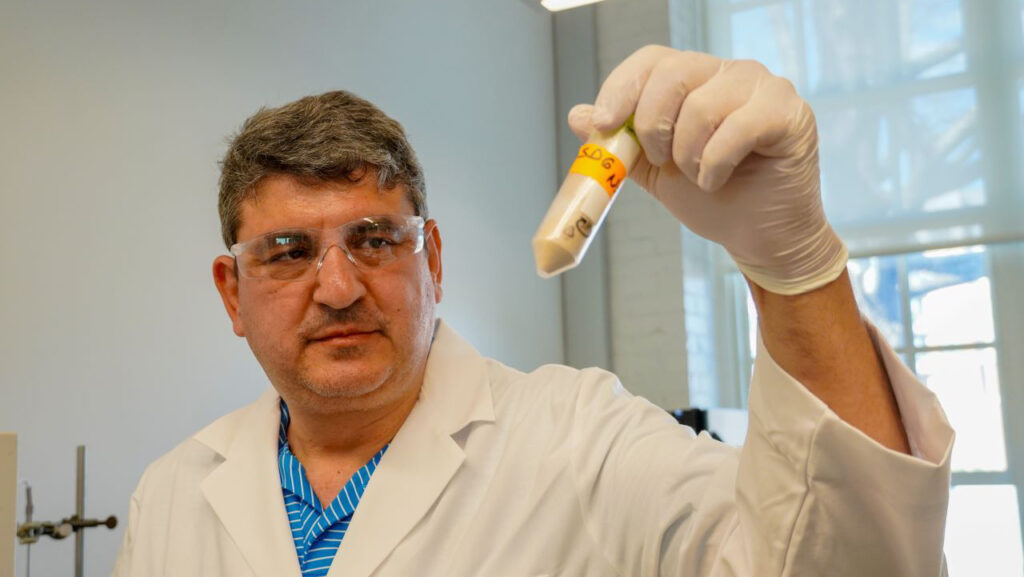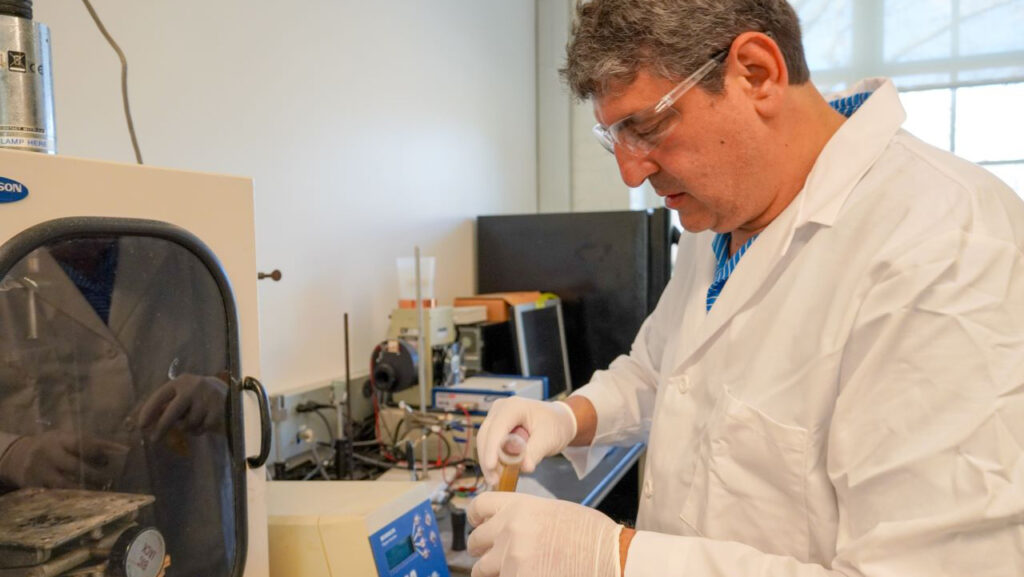Burak Aksoy, associate research professor in the College of Forestry, Wildlife and Environment at Auburn University (CFWE), developed two novel products to help reduce waste in commercial aquaculture feed pellets and meat products intended for human consumption.

Auburn University Research Professor Burak Aksoy is shown in his lab while preparing the feed binder samples.
The first patent was awarded for an aquafeed binder based on soybean hulls. These binders help the pellets stay intact in the water until fish and/or shrimp can consume them. Keeping the pellets stable in the water improves feed efficiency and fish health and reduces the cost to farmers from loss of feed. It also improves water quality. Poor-quality pellets will disintegrate quickly, causing excess waste, which leads to high ammonia levels and extreme algae blooms. Algae die-offs can wipe out an entire pond’s fish population overnight.
Most commercial shrimp pellet binders contain urea formaldehyde, a known carcinogen that negatively affects shrimp health. Other natural solutions, like wheat gluten, starch and alginate are less effective, cost more, and have a competing human use.
Aksoy’s binder uses a new process to activate pectin and proteins in the soybean hulls, an agricultural byproduct with little value. The process also makes these nutrients available to fish, so this binder stabilizes the pellets and provides nutrition rather than toxins. Aksoy says the benefits are clear to the fish, humans who consume them and the environment.
With the aquaculture feed market in the United States worth more than $70 billion, Aksoy says his cost-effective binder provides a much-needed alternative solution to the problem of feed stability in water.
Aksoy’s second patent was awarded for a packaging solution aimed at reducing waste in the human food supply. Today, the annual economic loss due to food spoilage is $161 billion from 40 million tons of discarded food in the U.S.

Auburn University Research Professor Burak Aksoy is shown in his lab while working on one of the processing steps in the development of gas sensor components.
The primary cause of food spoilage is bacterial growth, says Aksoy. The current standard is the familiar “Sell by” date, which can be inaccurate on either side — food going bad before or after the date. In the first case, a customer buys a spoiled product, and in the second, the store must discard a product that is still safe for consumption.
Aksoy has developed an inexpensive solution for real-time freshness monitoring. All meats give off certain basic volatile compounds as they break down. His product is a gas-sensing coating that detects those compounds and is applied to a sticker that adheres directly to the packaging of meat products. The sticker monitors the presence of compounds that indicate spoilage and progressively changes color to indicate the freshness level of the product.
“Everyone — consumers and retailers — will know the level of freshness or spoilage at a glance and be able to act accordingly,” said Aksoy.
Aksoy said there has already been a great deal of industry interest, and he anticipates the products will have global appeal.
“These two innovations have great economic potential alongside their promise for advancing sustainability and reducing waste,” said Janaki Alavalapati, the Emmett F. Thompson Dean of the CFWE. “Both of his solutions are scalable, affordable and can easily be manufactured by adapting existing machinery, so there are fewer infrastructure costs at the start.”
The products were developed in collaboration with the Mediha Yildirim-Aksoy and Benjamin Beck from the U.S. Department of Agriculture, Agricultural Research Service (USDA-ARS), and Zhihua Jaing from the Alabama Center for Paper and Bioresource Engineering (ACPBE). Navid Etebari Alamdari of the ACPBE was also involved in developing the gas detectors.
To learn more about the CFWE’s sustainable biomaterials and packaging research and academic programs, visit cfwe.auburn.edu.
(Written by Jessica Nelson)










